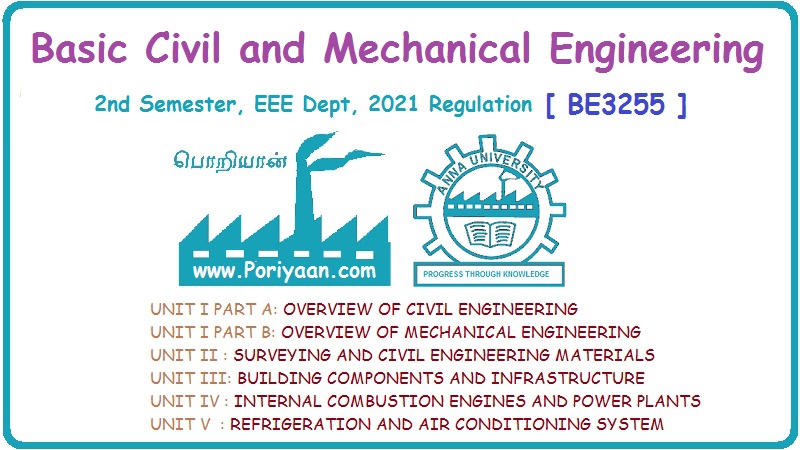Basic Civil & Mechanical Engineering: UNIT I: a. Overview of civil engineering
Civil engineering contributions to the welfare of society
Civil engineers work on the planning, design, construction and maintenance of projects such as roads, buildings, tunnels, airports, dams, bridges, and water supply and sewage systems.
CIVIL ENGINEERING CONTRIBUTIONS TO THE WELFARE OF SOCIETY
Civil
engineers work on the planning, design, construction and maintenance of
projects such as roads, buildings, tunnels, airports, dams, bridges, and water
supply and sewage systems. Civil engineers work as part of a team with a wide
range of backgrounds and often use theory and models to predict how a design
will perform. They generally test ideas in the field using scale mockups to
prove new design theories without endangering lives. By developing the
infrastructure for the society, civil engineers are essentially building the
backbone for the world to relax on.
Çivil
engineering has played a critical role in increasing the health and quality of
life, by developing better water supplies, municipal sewer systems, waste water
treatment plants to protect from natural hazards and provide health care,
improved agriculture through water resource development and distribution
projects, rapid and dramatic changes in transportation systems. Civil engineers
have developed the basic infrastructure with which the modern society is
dependent on.
Structural
engineers are concerned with the conception, analysis, design and construction
of components or assemblies to resist loads arising from internal and external
forces. In addition to steel and concrete, new materials that are being
developed and used in structural engineering include reinforced plastics and
polymers. Typical civil engineering structures include large buildings, bridges
and dams.
Geotechnical
engineering is the study of the behavior of soils under the influence of
loading forces and soil-water interactions. This knowledge is applied to the
design of foundations, retaining walls, earth dams, clay liners, and
geosynthetics for waste containment. The goals of geotechnical engineers could
range from the design of foundations and temporary excavation support, through
route selection for railways and highways, to the increasingly important areas
of landfill disposal of wastes and groundwater contamination.
Transportation
has always played an essential role in the development of society, originally
with regard to trade routes and harbors, but presently with regard to land and
air-based systems as well. It is the civil engineer's responsibility to plan,
design, build, operate and maintain these systems of transport. Civil engineers
do it in such a way as to provide for the safe, efficient and convenient
movement of people and goods. The highway designed by a civil engineer
adequately supports the weight and stresses of the vehicles in motion and of
the centrifugal forces at the curves.
Civil
engineers ensure that societal development and the use of water, land and air
resources are sustainable. This goal is achieved by managing these resources so
that environmental pollution and degradation is minimized. The water resources
system designed by a civil engineer ensures water intake at an appropriate
source, water conveyance that transports water to a water treatment plant and
water distribution, delivering sanitized water to the society. Thus, the
contributions of civil engineering to the welfare of society are very
significant.
Basic Civil & Mechanical Engineering: UNIT I: a. Overview of civil engineering : Tag: : - Civil engineering contributions to the welfare of society
Related Topics
Related Subjects
Basic Civil and Mechanical Engineering
BE3255 2nd Semester 2021 Regulation | 2nd Semester EEE Dept 2021 Regulation
